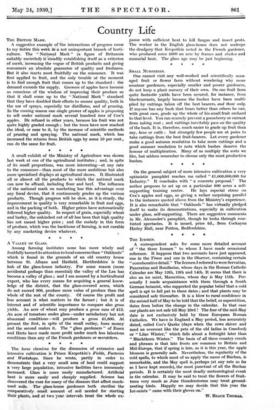THE ICEMEN.
A correspondent asks for some more detailed account of " the three fremen " to whoni I have made occasional reference. It happens that two accounts have just appeared, one in the Times and one in the Observer, Containing certain "corroborative detail." The Icemen I referred to Were Servatius, Pancratius and Bcinifacius, whose days in the Roman Catholic Calendar are' May 12th, 13th and 14th. It seems that there also an ice saint, Mamertius, whose day. is May 11th. Per- sonally I made acquaintance with them through a South German botanist, who supported the popular belief that a cold spell is apt to fall pat to these dates ; and that plants may be considered safe thereafter. It is- a blow to rural confidence in -the second half of May to be told thatthe belief, or superstition, *dates from before the change in the calendar. In that case out plants are not safe till May 23rd The fear of the mid-May date is not exclusively held by these European Roman Catholics. We have in England a May period, less accurately dated, called Coo's 'Quake (days when the cows shiver and need an overcoat like the pets of the old ladies in Cranford) or " Lilac Winter," which falls about a fortnight later than " Blackthorn Winter." The basis of all these country creeds and phrases is that late frosts are common to Britain and Mid-Europe, that if spring is late, as it is this year, the apple blossom is generally safe. Nevertheless, the regularity of the cold spells, to which most of us apply the name of Buchan, is remarkable, and the May spell is, perhaps (at any rate so fat as I have kept records), the most punctual of all the Buchan periods. It is certainly the most deadly meteorological event in the calendar. It may be said to treat the flowers of fruit- trees very much as June thunderstorms may treat ground- nesting birds. Happily we may decide that this year the
Ice-saints " came with their gloves on." -
W. BEACH THOMAS.






































 Previous page
Previous page